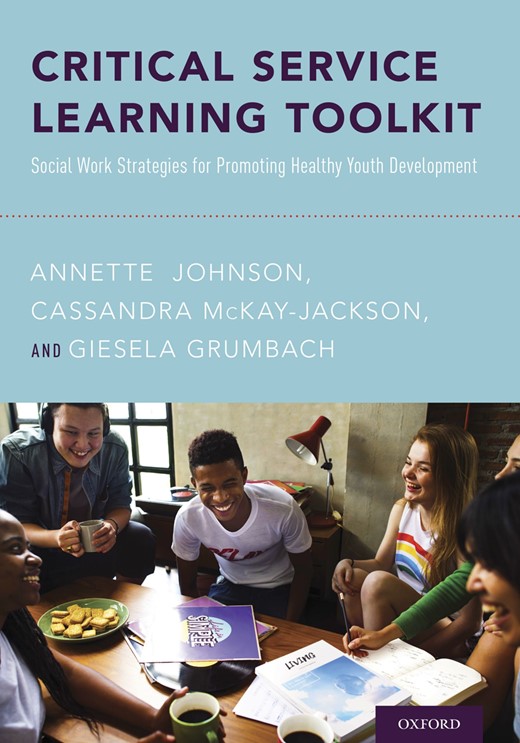 Critical Service Learning Toolkit: Social Work Strategies for Promoting Healthy Youth Development
Critical Service Learning Toolkit: Social Work Strategies for Promoting Healthy Youth Development
Contents
1one Transforming Service Learning Into Critical Service Learning
Get access-
Published:February 2018
Cite
Abstract
Service learning is a pedagogical approach that engages youth in achieving learning goals that link communities and schools through intentional, structured activities (McReynolds, 2015). Through service learning, the practitioner engages students in projects that serve the community while building social, civic, and academic skills to help them learn about others. Critical service learning, on the other hand, builds on service learning and expands to include social justice principles. Critical service learning as an approach compels youth to interrogate systems and structures of inequality and distribution of power and to seek to develop authentic relationships among all participants (Mitchell, 2008). It also encourages participants to examine issues of power, privilege, and oppression within the service activity by questioning hidden biases and assumptions concerning race, class, and gender and to challenge the status quo by working toward changing inequities within social and economic systems (Cipolle, 2010). Engaging in critical service learning, as a therapeutic strategy, allows youth to con¬template community problem-solving through critical thinking that raises questions about the roots of social inequality. For example, youth who embark on service learning may develop a wellness project that considers the effect of health on mood and behavior. Students may incorporate simple physical exercises and healthy eating tips and create a nutritional food menu for students to share with their peers and families. Students who participate in this same example from a critical service learning framework not only will do all of these activities but also will critically analyze factors that contribute to healthy living. For example, students may explore the barriers to accessing fresh fruits and vegetables in communities that are food deserts (communities with a scarcity of mainstream markets that have fresh fruits and vegetables). Students may delve further to consider the economic and political decisions that reduce access to healthy foods in their neighborhoods. Students may perform action research through facilitating a shopping field trip to neighborhood, and mainstream food outlets to inspect and compare the produce for quality and price value. As a result, students may bring their findings to their local political office to request sup¬port to improve local food outlet resources.
Sign in
Personal account
- Sign in with email/username & password
- Get email alerts
- Save searches
- Purchase content
- Activate your purchase/trial code
- Add your ORCID iD
Purchase
Our books are available by subscription or purchase to libraries and institutions.
Purchasing information| Month: | Total Views: |
|---|---|
| October 2022 | 3 |
| February 2023 | 10 |
| April 2023 | 1 |
| July 2023 | 1 |
| November 2023 | 2 |
| December 2023 | 5 |
| January 2024 | 2 |
| April 2024 | 2 |
| May 2024 | 2 |
| June 2024 | 2 |
| August 2024 | 2 |
| November 2024 | 2 |
| December 2024 | 1 |
| March 2025 | 2 |
| May 2025 | 2 |

Get help with access
Institutional access
Access to content on Oxford Academic is often provided through institutional subscriptions and purchases. If you are a member of an institution with an active account, you may be able to access content in one of the following ways:
IP based access
Typically, access is provided across an institutional network to a range of IP addresses. This authentication occurs automatically, and it is not possible to sign out of an IP authenticated account.
Sign in through your institution
Choose this option to get remote access when outside your institution. Shibboleth/Open Athens technology is used to provide single sign-on between your institution’s website and Oxford Academic.
If your institution is not listed or you cannot sign in to your institution’s website, please contact your librarian or administrator.
Sign in with a library card
Enter your library card number to sign in. If you cannot sign in, please contact your librarian.
Society Members
Society member access to a journal is achieved in one of the following ways:
Sign in through society site
Many societies offer single sign-on between the society website and Oxford Academic. If you see ‘Sign in through society site’ in the sign in pane within a journal:
If you do not have a society account or have forgotten your username or password, please contact your society.
Sign in using a personal account
Some societies use Oxford Academic personal accounts to provide access to their members. See below.
Personal account
A personal account can be used to get email alerts, save searches, purchase content, and activate subscriptions.
Some societies use Oxford Academic personal accounts to provide access to their members.
Viewing your signed in accounts
Click the account icon in the top right to:
Signed in but can't access content
Oxford Academic is home to a wide variety of products. The institutional subscription may not cover the content that you are trying to access. If you believe you should have access to that content, please contact your librarian.
Institutional account management
For librarians and administrators, your personal account also provides access to institutional account management. Here you will find options to view and activate subscriptions, manage institutional settings and access options, access usage statistics, and more.